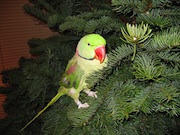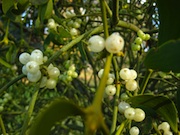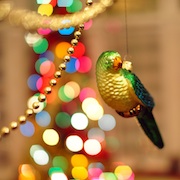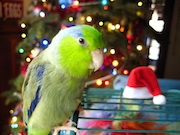Contents
- 1. Christmas trees are extremely attractive to companion parrots.
- 2. Many holiday plants are also potentially toxic.
- 3. Many holiday decorations can be toxic.
- 4. Electric wires represent an enticing danger for pet birds.
- 5. Strong fumes can be irritating — or even dangerous.
- 6. Cleaning agents can also be irritating, and some products are actually toxic.
- 7. Discourage furry visitors
- 8. The holidays are also associated with lots of cooking!
- 9. Resist the temptation to share holiday foods with your feathered friends
- 10. Holiday stress is not just a problem for humans
- Be Prepared!
The companion parrot is part of the family! While including our feathered friends in the holiday season, we must be sure to keep them safe:
1. Christmas trees are extremely attractive to companion parrots.

Unfortunately many Christmas trees are sprayed with chemicals, and the water used to sustain live trees may contain fertilizers.
2. Many holiday plants are also potentially toxic.

- Chrysanthemum
- English Ivy (Hedera helix)
- Holly (Ilex spp.)
- Mistletoe (Viscum album)
- Poinsettia (Euphorbia pulcherrima)
- Yew (Cephalotaxus sp.)
3. Many holiday decorations can be toxic.
Ornaments may be made from cheap materials containing heavy metals. Curious beaks may chew on ribbons or tinsel, which can cause intestinal blockages.
4. Electric wires represent an enticing danger for pet birds.
Birds may chew on Christmas tree light sets used to decorate trees or windows, risking serious injury or death.
5. Strong fumes can be irritating — or even dangerous.

When compared to lowly mammals, birds possess a highly efficient respiratory tract. This anatomic upgrade means that birds can extract much more oxygen from the air — a benefit during flight — however this also means that birds can inhale irritating or even toxic particles much more easily and in much greater quantities.
Do not expose your pet bird to scented candles, potpourri, or room fresheners. Also protect your bird from second-hand cigarette smoke.
And don’t forget about the danger of cooking fumes, particularly from overheated nonstick pots and pans. The vapors released by superheated teflon (polytetrafluoroethylene) are known to be toxic to birds, potentially causing serious respiratory distress or even death.
6. Cleaning agents can also be irritating, and some products are actually toxic.
Holiday visitors mean holiday cleaning. The strong smells released from cleaning agents can release powerful fumes that can also be extremely irritating to the sensitive avian respiratory tract. Use of items such as carpet cleaner or bleach has been associated with death and illness in birds.
7. Discourage furry visitors
Discourage guests from bringing dogs or other pets into your home. If strange animals do enter your home, keep them separated from your pet and remain vigilant since predatory instincts can kick in suddenly.
8. The holidays are also associated with lots of cooking!
Confine your pet bird to its cage to prevent accidents with pots of boiling water and pans of frying food.
Many human foods can cause serious illness in pet birds.
- Do not offer salty snacks or items containing caffeine, avocado, alcohol, and rhubarb.
- Never offer chocolate to pet birds. Chocolate contains theobromine, which is toxic to birds and other animals.
- Sweet treats frequently irritate the gastrointestinal tract.
10. Holiday stress is not just a problem for humans

Take your bird’s personality into account when making them part of your holiday. Some individuals enjoy the noise and excitement of holiday festivities, while other birds may become stressed. “Shy” birds may do better with a view of holiday activity from a distance.
Regardless of your bird’s personality, keep their daily schedule as consistent as possible and be sure to spend time with your pet on a daily basis.
Be Prepared!
The incidence of pet accidents increases dramatically during the holiday season. No matter how careful you are, your pet can be injured or ingest something toxic so be prepared.
- Many veterinary clinics have limited office hour during the holidays. Will your avian veterinarian be available?
- Also keep contact information for your local emergency veterinary service as well as the ASPCA Animal Poison Control Center: 1-888-426-4435 or the Animal Poison Control Center website. If you suspect that your bird has ingested something harmful, seek medical attention immediately.






